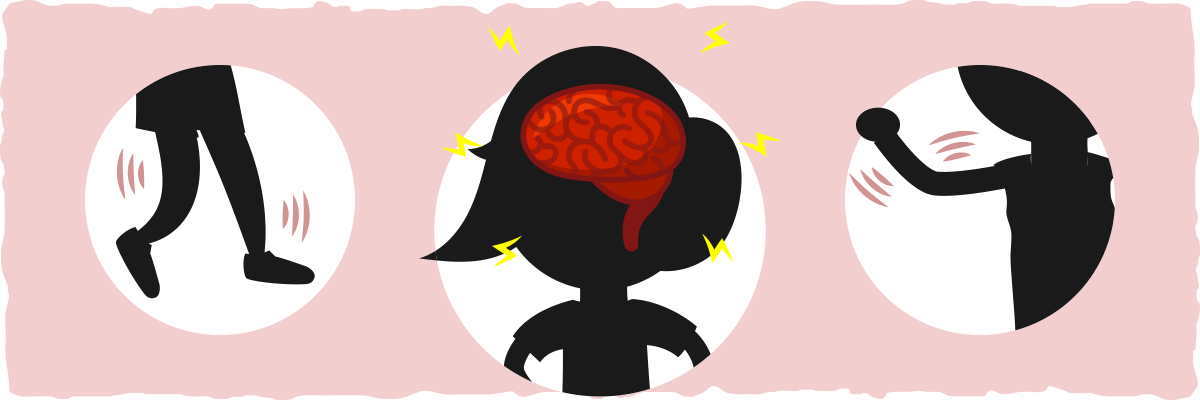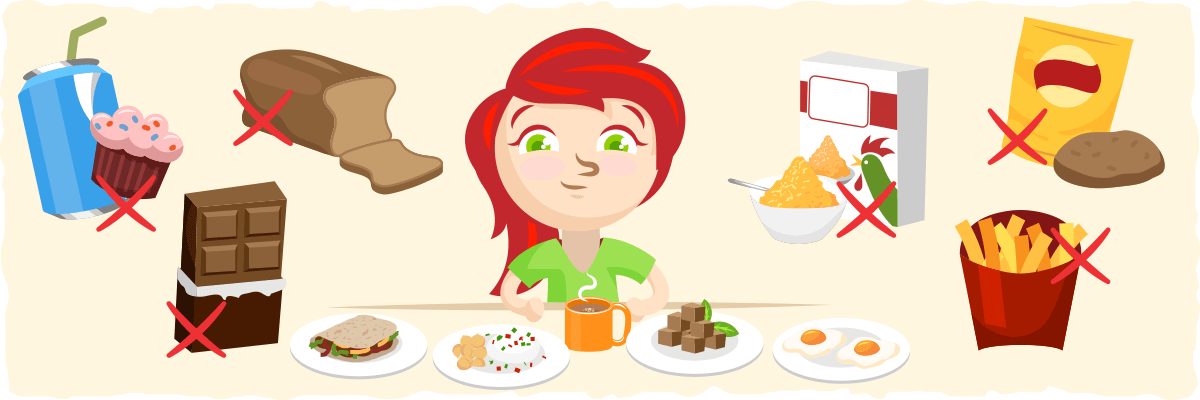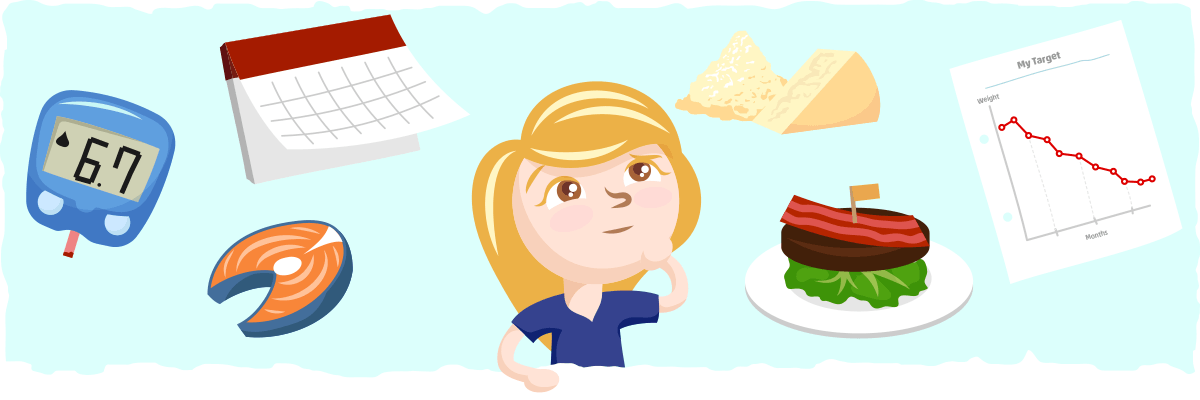Many people use the ketogenic diet today to manage symptoms of diabetes, lower triglycerides, and lose body weight. However, the high fat, adequate-protein, low-carbohydrate ketogenic diet was not first used for any of these purposes.
Instead, doctors created it to help treat epilepsy in children. Below we give a brief overview of epilepsy, specifically pediatric epilepsy, and the origins of using keto to treat it. Then, we investigate the hard evidence from high-quality research showing its effectiveness.
We hope that children and adolescents who utilize the ketogenic diet to treat epilepsy can use Ruled.me to live a healthy, fulfilling lifestyle.
A Brief Primer on Epilepsy

Epilepsy is a disorder of the nervous system in which someone experiences recurrent, unpredictable seizures. It is a result of abnormal activity in the human brain. Epileptic seizures can include physical symptoms such as muscle spasms, convulsions, and unconsciousness, as well as mental symptoms such as strange behavior, unusual emotions, and a warped perception of the outer world.
Epilepsy is not a one-size fits all disorder. Some people experience severe, disabling seizures while others experience ones that are much less life threatening and more infrequent. Additionally, while epilepsy is a disorder of the brain and nervous system, its underlying causes can vary greatly. It can result from changes in channels between brain cells, unevenness between chemicals in the brain called neurotransmitters, a disruption of brain wiring, or any combination of these or other causes.
Someone is formally diagnosed with epilepsy when she or he has had two or more seizures without a clear cause in a period over 24 hours. [1] If someone has a single seizure due to something such as a head injury, alcohol withdrawal, or fever, she or he most likely does not have epilepsy. [1] Usually, a diagnosis is made by reviewing patient history and measuring electrical activity in the brain using technology such as magnetic resonance imaging (MRI).
Epilepsy can affect people of all ages. However, it occurs more frequently in young children and the elderly than in adults. According to the Columbia Department of Neurosurgery, some research estimates that up to 4% of children experience epilepsy. It is unknown why the young, developing brain is more predisposed to seizures than adult brains. In this piece, we will primarily focus on epilepsy that affects children ages 0-18 years.
According to The Epilepsy Foundation, an estimated 65 million people in the world have epilepsy including 3 million in the United States alone. An estimated 1 in 26 American citizens will develop epilepsy at a point in their lifetime. About 150,000 new cases of epilepsy are diagnosed in the United States every year. According to the World Health Organization (WHO), it is the fourth most common neurological disorder in the world and about 80% of epileptic cases occur in the developed world. [2] The Cleveland Clinic estimates that about 45,000 children are diagnosed with pediatric epilepsy each year.
Despite its prevalence, epilepsy is not a particularly well understood condition. According to the Epilepsy Foundation, about one third of people with epilepsy live with frequent, uncontrollable seizures because no treatment works for them. Furthermore, an estimated 60% of people with epilepsy don’t know the root cause of their disorder. This means that doctors are not able to understand the underlying cause of epilepsy in the majority of patients. However, there are treatments available that might be helpful.
Treating Epilepsy
While epilepsy is not a very well understood disorder, the medical community has devised some methods to help manage it. Many prescription drugs are available including Carbamazepine (Carbatrol) and Diazepam (Valium). Each one is designed to treat a certain type of epilepsy sometimes in a certain population (i.e. children).
A comprehensive list of drugs can be found here at WebMD. Certain surgeries remove a part of the brain can help treat epilepsy. Usually, a patient needs to try at least two anti-epileptic drugs before trying surgeries. According to the National Institutes of Health, about 70% of individuals can manage seizures with modern drugs and surgeries. However, sometimes these don’t work.
Research Starts Assessing the Keto + Epilepsy Connection

And that’s where the ketogenic diet comes in. In the 1924, Dr. Russell Wilder at the prestigious Mayo Clinic designed the diet to treat epilepsy in children. Research indicated that it was highly effective. [3] However, when new anti-seizure medications emerged in the 1940s, doctors and dietitians started using it less. In 1993, Jim Abraham’s son Charlie started using the ketogenic diet because conventional therapies were ineffective in treating his epilepsy.
His situation dramatically improved quickly and he was able to complete recovery from daily seizures. Thus, in 1994, his family started the Charlie Foundation to spread awareness of the diet. Today, he is now seizure-free and lives a normal, healthy lifestyle.
Doctors and dietitians have used the ketogenic diet to treat epilepsy for a while, especially in children that aren’t responsive to conventional treatment. Recently, scientists have started to investigate its effectiveness in managing seizures using high-quality clinical trials. Below we document several key studies published in the past 20 years.
Landmark Study
The first high-quality study assessing the use of the ketogenic diet on children was published in 1998 in the Journal of Pediatrics. In their randomized trial, researchers recruited 150 children ages 1 to 16 years that had an average age of 5.3 years.
Nearly all of them had more than two seizures per week despite taking at least two medications commonly used to reduce seizures. Investigators provided the children with a ketogenic diet for a one-year trial. They assessed the children’s’ seizure frequency and compliance with the diet.
Three months after starting the diet, 83% of subjects remained on the diet. [4] About 34% of the children, or slightly over one-third, had over a 90% decrease in seizures. [4] After 6 months, 71% of the children remained on the ketogenic diet and about 32% had over a 90% decrease in seizures. [4] After a full year, 55% remained on the diet and 27% at least a 90% decrease in seizures. [4] These data indicate that keto was highly effective in reducing seizures in a sizable number of children.
Thus, the researchers stated, “The ketogenic diet should be considered as alternative therapy for children with difficult-to-control seizures.” [4] They even continued by noting, “It is more effective than many of the new anticonvulsant medications and is well tolerated by children and families when it is effective.” [] This means that not only was the ketogenic diet helpful, but it was more helpful than some commonly used drugs!
Perhaps the biggest issue mentioned in the study was sticking with the diet. Some subjects discontinued the diet because it was not effective for them or too restrictive. Thus, if using the ketogenic diet, it is critical to monitor your progress to see if it is working for you. Similarly, if you are having problems sticking to the diet, using a keto lifestyle service such as Ruled.me and a registered dietitian (RD) can be very helpful.
Key Takeaways: The ketogenic diet is a highly effective treatment for epilepsy in some children that don’t respond to anti-epileptic drugs. Some children may yield better results utilizing the ketogenic diet than other children to reduce seizures.
Recommendations: If conventional therapies are not helping you or your child reduce lower the frequency of seizures, strongly consider using ketogenic diet. Remember to discuss a suitable plan with your doctor and a registered dietitian, and monitor its effectiveness. Use Ruled.me to gain access to critical information on the keto lifestyle and community that will help you stick to the diet.
High-Quality Research on Keto + Epilepsy
The highest quality study assessing the impact of the ketogenic on pediatric epilepsy was published in The Lancet Journal of Neurology. A group of eight researchers recruited 145 children for a 3-month intervention study. The children were all between ages 2 and 16 and failed to have a positive response to at least two anti-epileptic drugs. None had previously participated in the ketogenic diet.
Investigators divided the children into two separate groups. The first group of 73 children ate a ketogenic diet while the second group of 72 received continued conventional therapy without the ketogenic diet. Throughout the study, all children stayed in one of two hospital centers or a residential facility for children with epilepsy.
Of the 73 children enrolled to the ketogenic diet, 54 successfully completed the study (about 74%).

Of the 72 controls, 49 successfully completed the trial (about 68%). [5] Thus, the authors noted that the ketogenic diet was not particularly difficult for children to stick with. When looking at the data, researchers noted that the total number of seizures had decreased significantly more in the ketogenic group compared to the control group.
Additionally, the researchers noted that only four controls had a 50% reduction in seizures. In contrast, 28 children in the ketogenic diet group (38%) had a 50% reduction in seizures. [5] This is seven times as many children. Additionally, five children eating the ketogenic diet experienced a 90% reduction in seizures. [5] None of the control subjects experienced this level of decrease. A sizable minority of subjects experienced side effects such as fatigue. However, dietitians easily managed these symptoms
Because of the very promising data, the authors of the study noted “, the results from this trial of the ketogenic diet support its use in children with treatment-intractable epilepsy.” [5] Similarly, a leading clinical researcher reviewing the article stated, “The ketogenic diet should be considered for the treatment of children with drug-resistant epilepsy and not only as a last resort.” [6] He also emphasized, “The allocation of resources to support professionals in administering the ketogenic diet is justifiable.” [6]
Key Takeaways: A high-quality randomized trial found that children resistant to drugs that treat epilepsy experienced large reductions in seizures when using the ketogenic diet. In contrast, children that continued conventional drugs treatments experienced minimal decreases in the number of seizures.
Recommendations: If your child with epilepsy is not responding to conventional anti-epileptic therapies, consider using a ketogenic diet. Consult with a doctor to monitor regularly the effectiveness of the diet. Additionally, use Ruled.me for information on how to optimize your ketogenic diet for health and consult with a dietitian for further individualized guidance.
Long-Term Impacts of Ketogenic Diet

Another study from the Journal of Pediatrics looked at the long-term impacts of the ketogenic diet in children. For the trial, the authors looked at 150 children who had participated in a one-year trial on the ketogenic diet. Then, they followed up with them 3 to 6 years after they had completed the study.
Of the 150 patients, 20 children (about 13%) were seizure-free. [7] An additional 21 (about 14%) had a 90% to 99% decrease in the number of seizures. [7] 29 subjects no longer took anti-epileptic medications and another 28 only took one medication. No subjects experienced any cardiac problems.
Due to these findings, they stated ”three to 6 years after initiation, the ketogenic diet had proven to be effective in the control of difficult-to-control seizures in children.” [7] They went on to state that “it is more effective than many of the newer anticonvulsants and is well-tolerated when it is effective.” [7] Thus, the ketogenic diet can be a cost-effective treatment for recurring epilepsy in the long-term.
A study published last year in the European Journal of Pediatric Neurology also supports the ketogenic diet’s long-term benefits in treating epilepsy. Using data from five health centers, the research team looked at 290 children treated using a ketogenic diet for two years. They specifically assessed data on seizure frequency and any side complications of the diet.
Scientists referred to subjects that decreased their seizure frequency by more than 50% as “responders”. The number of responders at 6, 12, and 24 months was 50%, 46%, and 28%, respectively. At these time intervals, 16%, 13%, and 10% of these subjects were seizure-free. The best outcomes were in the 22 subjects that had less than one seizure per day before the study. At six, 12, and 24 months 45%, 41%, and 32% had become seizure-free respectively.
It is important to note that the reason why outcomes diminished over time was that adherence to the ketogenic diet declined as time went on. After 6, 12, and 24 month, 80%, 64%, and 41% were still on the diet. The researchers also emphasized, “No child had an increased seizure-frequency.” [8]
Researchers were also careful to monitor any complications. Of the 290 subjects, only 29 experienced notable side effects. Most were easily treated and only four subjects stopped entirely: two due to high levels of triglycerides and cholesterol (hyperlipidemia) and two due to kidney stones. Researchers found potassium citrated particularly effective in preventing kidney stones. Due to their findings, the researchers stated, “Our survey of 290 children showed that KD is effective and well tolerated, even in such severe patients with therapy-resistant epilepsy.” [8]
Many trials note that the ketogenic diet works with some children but not with others. So, how can we predict which ones will have fewer seizures once switching to keto?
In a retrospective study from 2015, a group of researchers assessed the use of the ketogenic diet in treating epilepsy. They examined 59 children with refractory epilepsy over a 9.5-year period. Twenty-four children were still on the ketogenic diet after 12 months. Twenty-one of these subjects experienced a 50% reduction in seizures.
The researchers stated, “The KD can be an effective treatment in reducing seizures in children with refractory epilepsy.” [9] Additionally, they noted, “Children with a successful response at 3 months were significantly more likely to achieve success at 12 months of KD treatment.” [9] Thus, the response after 3 months is an indicator of how effective the ketogenic diet will be in the long-term
Key Takeaways: The ketogenic diet is an effective method to reduce the number of seizures in children with epilepsy. More studies lasting longer than two years should be done to assess its long-term impact.
Recommendation: If using the ketogenic diet to treat epilepsy, remember to regularly monitor its effectiveness.
A Broad Analysis of the Research
A meta-analysis published in the Journal of Neurology assessed the impact of the ketogenic diet in treating epilepsy. They included a total of 19 studies that included a total of 1084 patients. The mean age of the subjects was 5.78 years.
They defined treatment success as having at least a 50% reduction in seizures. After analyzing the data, they noted that patients staying on the diet had a 2.25 times greater probability of treatment success. [10] The most common reasons for discontinuing the diet were lack of treatment of success and difficulty sticking to the diet. Due to the findings, the researchers concluded that “this meta-analysis shows that current observational studies reporting on the therapeutic effect of the ketogenic diet contain valuable statistical data.” [10]

A research overview from 2012 stated that it was not possible to perform a proper meta-analysis because of the variation of the trials. However, the authors noted, “All trials showed that at least 38% of patients had a 50% reduction in seizures compared to their comparative controls at three months.”
Additionally, this response sustained for up to a year. The study noted that some subjects experienced adverse effects, such as gastro-intestinal problems. However, these effects can be mitigated by proper planning with a registered dietitian and using services such as Ruled.me
Using Keto & Ruled.me for Pediatric Epilepsy
Pediatric epilepsy is a complex disorder with many different potential causes. Today, there are many prescription drugs and types of surgery that effectively treat it. However, the modern-day research shows that the ketogenic diet formed almost 100 years ago is highly useful in managing it.
Thus, if you or a loved one is suffering from pediatric epilepsy, we highly recommend you talk with a doctor or dietitian to see if it is a suitable plan for you. If so, use Ruled.me to gain access to a whole wealth of information on the keto lifestyle and a supportive community. And be sure to regularly monitor the ketogenic diet to see if it has a positive impact on your epilepsy and overall health
Sources
- Fisher, Robert S., et al. “ILAE official report: a practical clinical definition of epilepsy.” Epilepsia 55.4 (2014): 475-482.
- Vos, Theo, et al. “Global, regional, and national incidence, prevalence, and years lived with disability for 301 acute and chronic diseases and injuries in 188 countries, 1990–2013: a systematic analysis for the Global Burden of Disease Study 2013.” The Lancet 386.9995 (2015): 743-800.
- Wilder, R. M. “The effects of ketonemia on the course of epilepsy.” Mayo Clin Proc. Vol. 2. 1921.
- Freeman, John M., et al. “The efficacy of the ketogenic diet—1998: a prospective evaluation of intervention in 150 children.” Pediatrics 102.6 (1998): 1358-1363.
- Neal, Elizabeth G., et al. “The ketogenic diet for the treatment of childhood epilepsy: a randomised controlled trial.” The Lancet Neurology 7.6 (2008): 500-506.
- Felton, Elizabeth A., and Mackenzie C. Cervenka. “Dietary therapy is the best option for refractory nonsurgical epilepsy.” Epilepsia 56.9 (2015): 1325-1329.
- Hemingway, Cheryl, et al. “The ketogenic diet: a 3-to 6-year follow-up of 150 children enrolled prospectively.” Pediatrics 108.4 (2001): 898-905.
- Hallböök, Tove, et al. “Effectiveness of the ketogenic diet used to treat resistant childhood epilepsy in Scandinavia.” European Journal of Paediatric Neurology 19.1 (2015): 29-36.
- Vehmeijer, Florianne OL, et al. “Can we predict efficacy of the ketogenic diet in children with refractory epilepsy?.” european journal of paediatric neurology 19.6 (2015): 701-705.
- Henderson, C. Beth, et al. “Efficacy of the ketogenic diet as a treatment option for epilepsy: meta-analysis.” Journal of child neurology 21.3 (2006): 193-198.